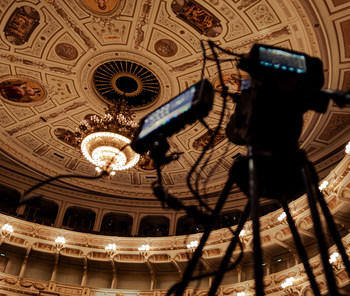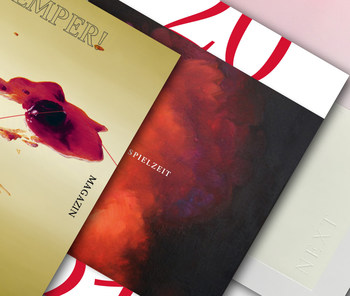Pietro Mascagni / Ruggero Leoncavallo
Premiere 16. January 2016
Performed in Italian with German and English supertitles
Piece-Info
These unrivalled examples of verismo opera transport us deep into the life of the countryside: In his »Cavalleria rusticana« from 1890, Pietro Mascagni shows how an everyday story of crossed love can end in death. And in Ruggero Leoncavallo’s »Pagliacci« (»The Clowns«) from 1892, the comedic performance of a travelling theatre troupe about Colombina’s lovers suddenly turns deadly serious. Jealousy, murder, and human wickedness, depicted in an impoverished rural milieu, these are the themes of the verismo composers. The two leading representatives of this movement, Mascagni and Leoncavallo, bring the human passions of southern Italy to the operatic stage in unique fashion. In this production, theatre and film director Philipp Stölzl stages these two murderous operas as a multi-level exploration of the human soul.
Cavalleria rusticana
It is Easter Sunday in a Sicilian village. Turiddu sings a love song to the beautiful Lola. She had become engaged to Turiddu before his military service, but when he returned she was already married to Alfio. Turiddu consoled himself with Santuzza, who truly loves him and who has a child with him. But Lola awakend his love again and they committed adultery. On easter morning, Alfio returns to his home village. He encounters Lucia, Turiddu’s mother, and tells her that he has seen her son near his house. Lucia is confused, as she had assumed that Turiddu had spent the night in the neighbouring village. Santuzza nervously interrupts their conversation. As the country people go into the church, Santuzza tells Turiddu’s mother of his infidelity. She wants to confront him and in all her ardour urge him not to leave her. But when Lola comes and sees Santuzza and Turiddu together, she manages, in just a few words, to provoke Turiddu into denying any feelings or responsibility for Santuzza. In the end, he casts Santuzza aside. Santuzza is in a state of despair. She now meets Alfio and tells him what has happened in his absence. She knows that this will be Turiddu’s death sentence and regrets it in an instant. Alfio will avenge himself because his honour demands it. At the end of the church service, Turiddu is in high spirits, to the point of near hysteria. He urges his neighbour to drink with him and also offers wine to Alfio. Alfio refuses; both of them know what will happen now. They embrace and Turiddu bites Alfio’s ear to signify, according to Sicilian tradition, that he is ready for a duel with knives. Turiddu says farewell to his mother, who fears the worst. He asks her to look after Santuzza if he should not return and then rushes off. The whole village is waiting in a state of high tension. Finally, we hear a cry: Turiddu has been killed.
Pagliacci
Prologue
The opera begins with a manifesto of verismo. An actor comes forward and explains to the audience the author’s intentions, namely to offer a true event from his own past. The singers might be actors, but they have feelings too, just like the audience.
Act 1
The people of a Calabrian village greet the members of a commedia troupe who have just arrived. Their leader, Canio, invites the people to attend their performance that same evening. Tonio, the hunchbacked figure of fun in the ensemble, approaches Canio’s wife, the actress Nedda, and is unjustly rewarded with a box on the ears from Canio. He might play a harmless fool in their performances, says Canio to the villagers, but in real life, an act of infidelity by Nedda would have dreadful consequences. Left on his own, Tonio approaches Nedda again in an attempt to seduce her; when she refuses, he even attempts rape. Nedda takes a whip and strikes Tonio in the face, at which he withdraws, full of hatred. Shortly afterwards, the villager Silvio appears, with whom Nedda is indeed having an affair. He tries to convince her to run away with him. But Tonio has been listening and by the time they kiss, he has already returned with Canio in order to exert his revenge. Silvio is able to flee just in time and Nedda refuses to tell her husband the name of her lover, despite being threatened with a knife. The other actors rush up and prevent things from going any further. They even manage to convince their enraged leader to give the performance.
Act 2
Collecting money before the show, Nedda is able to warn Silvio. The audience is waiting expectantly for the performance to begin: it is to be a typical commedia dell’arte play about Pagliaccio, the clown whose wife Colombina betrays him with Arlecchino. The production begins and, as fate would have it, everyone now plays the role on stage that they have just acted out in real life, except that Nedda’s lover Silvio is sitting anonymously in the audience. Colombina’s lover Arlecchino manages to get away, but when her husband asks the name of her lover, Colombina (Nedda) gives the same answer that she had given him earlier, in real life. Canio abandons his role and now demands on stage to know the name of his wife’s lover. Nedda, unmoved, keeps on acting; the audience is confused, unsure any more as to whether they’re seeing great acting or reality. In his rage, Canio grabs a knife and stabs his wife, at which she cries out to Silvio to help her, so betraying his identity. Canio grapples with him and murders him too. »The play is over« are his final words.
Gallery
Cavalleria rusticana / Pagliacci















